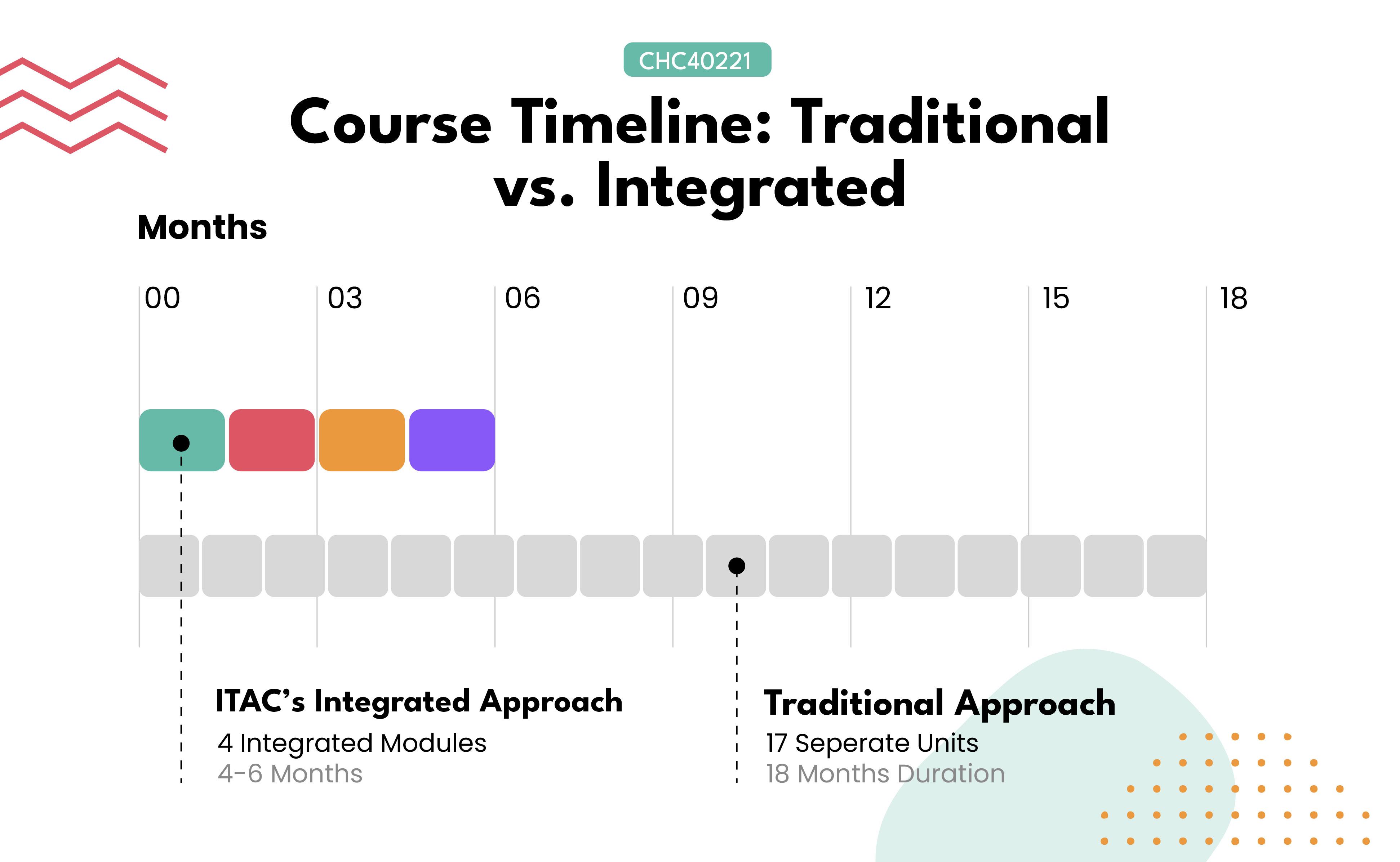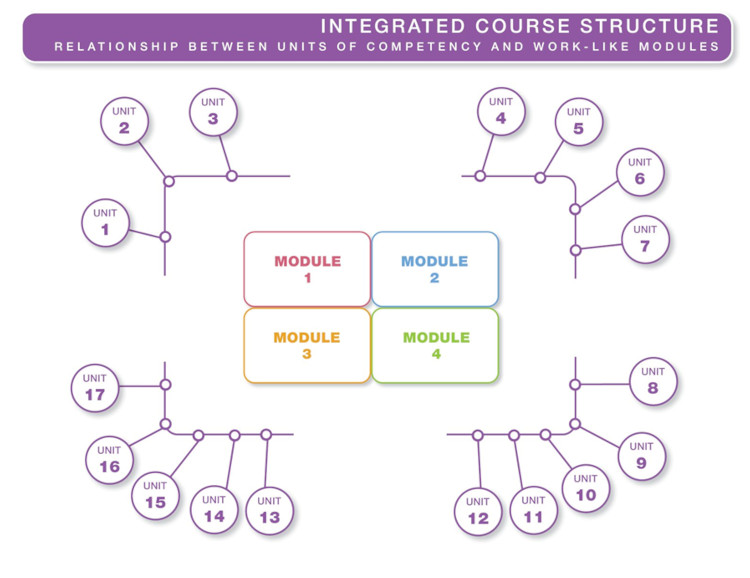
A Guide to Teacher Aide Courses in Australia

In Australian classrooms, teacher aides are the unsung heroes who work diligently to support students' academic, social, and emotional growth. Also known as education support workers, teacher assistants, learning support officers (LSOs), or student support officers (SSOs), these dedicated professionals play a vital role in creating inclusive learning environments where every student can thrive.
If you're considering a rewarding career as a teacher aide, you may be curious about the pathways to gain the necessary qualifications and skills. This in-depth article explores the landscape of teacher aide courses in Australia, serving as your guide to key topics such as:
- Roles and responsibilities - Understanding the diverse roles and responsibilities of teacher aides in various educational settings, from primary and secondary schools to specialist support programs
- Course options - Discovering nationally recognised qualifications that equip you with job-ready skills, including the CHC30221 Certificate III in School Based Education Support, CHC40221 Certificate IV in School Based Education Support, and the Education Support Combo
- ITAC benefits - Exploring the unique advantages of ITAC's teacher aide courses, which offer flexible online learning, accelerated completion options, and strong industry connections
- Pay and entitlements - Providing insights into the rewarding career prospects and pathways for growth in the education support sector, with competitive salaries ranging from $50,000 to over $70,000 per year
- FAQs - Addressing frequently asked questions about studying teacher aide courses and working in the field, including course durations, entry requirements, and placement opportunities
By the end of this guide, you'll have a clear roadmap for becoming a teacher aide in Australia and making an impact in students' lives. Whether you're drawn to supporting primary school children, assisting in high school classrooms, or working with students who have additional needs, understanding the right course options is key to kickstarting your fulfilling career in education support.
Navigating This Article
This detailed guide covers everything about the ITAC’s teacher aide courses available in Australia.
Quick Links - If you don't need the full article:
- CHC30221 Certificate III in School Based Education Support
- CHC40221 Certificate IV in School Based Education Support
- Education Support Combo - Our Most Popular Option
Key Resources:
Contact Us:
- Phone: 1300 858 191
- Email: info@itac.edu.au
- Contact Page
Below you'll find links to an in-depth exploration of each topic - simply select the area you'd like to learn more about:
Table of Contents
- Quick Overview of Teacher Aide Courses in Australia
- Exploring Teacher Aide Roles in Australian Schools
- Understanding the Difference Between Certificate III and IV in School Based Education Support
- A Day in the Life of Teacher Aides Across Australia
- Personal Qualities for Success as an Australian Teacher Aide
- The Smart Financial Choice: How ITAC's Integrated Learning Approach Saves You Time and Money
- Frequently Asked Questions About Teacher Aide Courses in Australia
- 1. What are the entry requirements for a CHC30221 Certificate III or CHC40221 Certificate IV in School Based Education Support?
- 2. How long does it typically take to complete a teacher aide course?
- 3. Can I study a teacher aide course entirely online, or are there in-person components?
- 4. What can I expect from the work placement component of a teacher aide course?
- 5. How will a teacher aide course equip me to support students with additional needs?
- 6. What are the employment prospects for teacher aide course graduates?
- 7. What are the assessments like in ITAC’s teacher aide courses?
- Conclusion: Choosing the Best Teacher Aide Course for Your Education Support Career
Quick Overview of Teacher Aide Courses in Australia
Teacher aides are essential members of Australia's education system, supporting students' learning and well-being in diverse classroom settings. If you're passionate about making a difference in young lives, a career as a teacher aide could be your calling. The first step is gaining the right qualifications through a nationally recognised teacher aide course.

Comparing course
In Australia, several course options are available to aspiring teacher aides:
- CHC30221 Certificate III in School Based Education Support
- Entry-level qualification, particularly suited to younger learners or those learning English
- Provides foundational skills for working in mainstream classrooms under direct teacher supervision
- Covers core topics like supporting literacy and numeracy with basic instructional techniques
- CHC40221 Certificate IV in School Based Education Support
- Similar content to CHC30221 but focuses on supporting students with additional needs, particularly autism, ADHD, ID and developmental delay
- Starting point for most adult learners (or the Education Support Combo)
- Suits those seeking to take on higher-level roles or work in specialist support settings with more independence
- More opportunities in terms of positions, roles, and responsibilities
- Typically comes with higher pay ($5-10,000 above Certificate III roles)
- Education Support Combo
- Combines both the Certificate III and IV in one streamlined program
- Most popular and highly recommended pathway
- Graduates gain a well-rounded skillset for supporting all learners
- Broadens career opportunities across mainstream and specialist roles
- Can be completed in a similar timeframe to a single qualification
- Why study twice? Get two qualifications for not much more cost or time and boost your resume.
No matter which of ITAC's teacher aide courses you choose, you'll gain job-ready skills through our unique blend of interactive online learning, delivered by experienced local trainers, and practical experience in a real school setting during your included vocational placement.
Pro Tip: Most students opt for the Education Support Combo as it provides the most comprehensive training and best value for money.
Flexible Learning Options
We understand that every student's circumstances are unique. That's why we offer multiple study modes for our teacher aide courses:
- Online Learning: Study at your own pace with full support via email, phone, and weekly live Q&A sessions.
- Class-Based Learning: Available in Western Australia, offering one-day-per-week workshops with family-friendly hours.
- Experienced Learner Pathway: For students with significant work and life experience, allowing faster completion of their teacher aide course.
Self-Paced Learning
Our courses are designed for self-paced learning, allowing you to:
- Study at times that suit your schedule
- Spend more time on challenging topics and move quickly through familiar content
- Take breaks when needed without falling behind
Innovative Integrated Course Design
Our unique integrated approach to teacher aide courses saves you time and money:
- Study work-like modules instead of unit-by-unit saving months of time
- Complete two qualifications in slightly longer than it takes for one
- Get into the workforce sooner and start earning
Structured Support
While our courses offer flexibility, they're not without structure. We provide:
- Weekly live Q&A sessions with experienced trainers
- Regular check-ins to monitor your progress
- Due date reminders to keep you on track
This balance of flexibility and support ensures that you can study at your own pace while still making steady progress towards your qualification.
Whether you're a fast learner aiming to complete your course quickly, or someone who needs more time to balance study with other commitments, ITAC's flexible approach to course duration ensures that you can achieve your goal of becoming a qualified teacher aide on your own terms.
Duration and Flexibility
At ITAC, we understand that our students come from diverse backgrounds with varying commitments and learning paces. That's why we've designed our teacher aide courses with flexibility and accessibility in mind.
We also design our teacher aide courses with busy adult learners in mind:
- Standard completion time: 26 weeks (approximately 600 hours)
- Extended enrolment period: Up to 18 months just in case
- Self-paced learning to fit around your commitments
- Study 2 hours one week – 40 hours the next – it’s your choice
Whether you're balancing family, work, or other responsibilities, our flexible teacher aide courses allow you to study at a pace that suits you.
Work Placement in Accredited Teacher Aide Courses
A crucial component of all accredited teacher aide courses is the work placement. This hands-on experience is where theory meets practice, allowing you to apply your learning in real educational settings. At ITAC, we've designed our placement program to provide you with valuable, relevant experience that will set you up for success in your future career. Let's explore what our work placement involves:
- 100 hours of practical experience in a school setting
- Flexibility to complete placement in blocks or spread over time
- Support from local trainers based in major states, including on-site visits
- Opportunities to apply theoretical knowledge in real classrooms
Work placement is more than just a course requirement – it's a vital part of your learning journey. Here's why:
- Real-world Application: Apply the theories and strategies you've learned in real classroom situations.
- Confidence Building: Gain hands-on experience that boosts your confidence in working with students and teachers.
- Networking Opportunities: Make connections in the education sector that could lead to future employment.
- Skill Development: Refine your skills in areas like classroom management, student support, and collaboration with teachers.
- Career Insight: Get a firsthand look at what a career in education support entails.

Local Support Nationwide
We have experienced trainers based in all major Australian cities, including:
- Perth
- Adelaide
- Melbourne
- Sydney
- Brisbane
- Gold Coast
But our reach extends far beyond these cities. We regularly support students in regional and remote areas, ensuring that no matter where you are in Australia, you have access to quality education support training.
Our local trainers are industry veterans with decades of experience in the Australian school system. Many have worked as school leaders and managers, bringing a wealth of practical knowledge to their teaching.
Career Prospects After Completing a Teacher Aide Course
The job market for teacher aides in Australia is thriving. According to the Australian Government's Job Outlook, the number of Education Aides (including teacher aides) is expected to grow strongly over the next five years. This growth is driven by:
- Increasing focus on inclusive education
- Growing student numbers
- Recognition of the value of individualised support in learning
After completing your teacher aide course, you could work in:
- Primary schools
- Secondary schools
- Special education units
- Other specialist services
Teacher aides are particularly sought after in special needs education and high school settings, where shortages are more pronounced.
Your teacher aide qualification can lead to specialised roles, attracting a higher salary, such as:
- Special Needs Education Assistant: Support students with disabilities or learning difficulties.
- ESL (English as a Second Language) Support: Assist students from non-English speaking backgrounds.
- Indigenous Education Support: Work specifically with Aboriginal and Torres Strait Islander students.
- Literacy and Numeracy Support: Focus on helping students improve these fundamental skills.
While salaries can vary depending on location, experience, and specific role, the average annual salary for Education Aides in Australia is around $55,000 to $65,000. Experienced teacher aides or those in specialised roles can earn $70,000+ annually. Many teacher aide positions also offer the benefit of school hour schedules and school holidays, providing a good work-life balance.
Choosing the Right Provider: The ITAC Difference
When researching teacher aide courses, it's essential to find a provider that offers high-quality training, flexible learning options, and strong support to ensure your success. ITAC (Institute of Teacher Aide Courses) is Australia's leading specialist provider of teacher aide courses, and here's why:
- Unique integrated learning approach
- Our innovative course structure streamlines your learning by eliminating duplication across units
- Cover the same content in a fraction of the time, without compromising on quality
- Many students complete their studies in just 26 weeks, compared to 12-18 months with traditional delivery models
- Graduate job-ready sooner and start earning an income faster - potentially $30,000 to $70,000 more in your first year
- Flexible study options to suit your lifestyle
- Online learning that fits around your work and family commitments
- Structured and self-paced, with 24/7 access to engaging, interactive content
- Personalised support from experienced trainers who understand your goals
- Specialised Experienced Learner Pathway (ELP) for students with prior experience in the field, enabling accelerated completion
- Exceptional student outcomes
- 15+ years of experience delivering high-quality teacher aide training
- Consistently high completion rates and graduate satisfaction levels
- Links with 1000s of schools across Australia
- Many students secure employment directly through their vocational placement
- Dedicated support every step of the way
- Local trainers with real classroom experience in your area
- Personalised guidance and feedback to keep you on track
- Phone and email support from our dedicated support team
- Weekly live webinars held at different times so everyone can attend
By choosing ITAC for your teacher aide course, you'll benefit from our proven track record, industry-leading training, and unwavering commitment from highly experienced local trainers. Our unique approach ensures you'll graduate sooner so you can start earning contributing to the success of young learners in your local community much sooner.
Taking the Next Step
Becoming a teacher aide is an opportunity to turn your passion for supporting children into a rewarding profession. By investing in your education through a quality teacher aide course, you'll gain the practical skills and confidence to make a positive impact in classrooms and communities across Australia. Not only is the salary highly respectable, but you don’t work weekends, public holidays, evenings, or school holidays.
To learn more about ITAC's teacher aide courses and take the first step towards your new career, explore our website or reach out to our friendly team. We're here to support you every step of the way as you embark on this exciting journey in education support.
Exploring Teacher Aide Roles in Australian Schools
Teacher aides, also known as School Support Officers (SSOs), Student Learning Support Officers (SLSOs), teacher assistants, or education aides/assistants, are invaluable members of school communities across Australia. They work alongside teachers to support students' academic, social, and emotional development in various educational settings. If you're considering a teacher aide course to start your career in education support, it's essential to understand the diverse roles and responsibilities you may take on in Australian schools.

Primary Schools
In primary school classrooms, teacher aides play a vital role in supporting students' learning and development across various age groups and subject areas.
By completing a teacher aide course or qualification, such as the CHC30221 Certificate III in School Based Education Support or the CHC40221 Certificate IV in School Based Education Support, you'll gain the skills and knowledge needed to excel in this rewarding career in schools across Australia. This includes:
Early Childhood Education (Kindergarten to Year 2):
- Assisting young learners in developing foundational language and literacy skills, such as phonics, which involves learning the relationships between sounds and the written symbols (letters and numbers) that represent them
- Supporting play-based learning activities that foster creativity, imagination, social skills, and emotional development in the early years
- Helping students develop gross motor skills and coordination through physical activities, games, and team-based movement exercises
Most teacher aides in primary school work with this age group as teachers need hands-on support given the simple logistics of managing classrooms with large numbers of very young learners.
‘Early Childhood’ should not be confused with long daycare services, where the term is also used. This is a completely separate industry/course.
Middle Primary Years (Year 3 and 4):
- Supporting students in continuing to develop language and literacy skills by exploring a range of text types, genres, target audiences and authors or creators
- Working alongside teachers to support student learning across core subjects, including English, mathematics, science, and social studies (sometimes called HASS)
- Providing additional guidance and support to students who may need extra help grasping key concepts, completing assignments or staying on task
- Assisting teachers with preparing and organising engaging learning materials, classroom displays, and resources that create an inclusive learning environment
Upper Primary (Year 5 and 6):
- Supporting students in developing more advanced academic skills, subject-specific knowledge and study habits in preparation for the transition to secondary school
- Collaborating with teachers to implement differentiated teaching and learning strategies that cater to individual student needs, abilities and learning styles
- Providing targeted literacy and numeracy support to help students consolidate and extend their skills in these critical areas before high school (providing students with sufficient language skills to study specialised subjects later on)
Throughout primary school, literacy and language learning remain a core focus, with teacher aides often working closely with students in dedicated reading and writing lessons. These sessions, which may take up to an hour each day, aim to develop key skills in reading comprehension, spelling, grammar, oral language, and written expression.
In addition to supporting the main classroom teacher, teacher aides may also work alongside specialist subject teachers, such as those teaching music, art, physical education, technology or languages other than English. In these classes, the teacher aide helps ensure all students can participate fully, assisting students who need help and contributing to a well-rounded educational experience.
By completing an accredited teacher aide course, you'll be well-equipped with job-ready skills to support children's academic, social and emotional growth during these crucial early years of learning and development.
Secondary School Settings (High School)
Teacher aides also play a crucial role in supporting high school students as they navigate more complex academic content and social dynamics. In secondary schools across Australia, you may find yourself:
- Collaborating with subject teachers to differentiate instruction and accommodate the diverse learning needs of students
- Providing targeted support to students who are struggling with specific subjects or concepts, helping them build confidence and understanding
- Implementing individual learning plans or behaviour support strategies to help students overcome challenges and reach their full potential
- Facilitating small group discussions or study sessions to reinforce key ideas and assist students in preparing for exams
With the skills gained through a nationally recognised teacher aide qualification, you'll be well-equipped to support secondary students' success and help them thrive in their high school years.
Most teacher aides in high school are there to support one or more focus students who are assigned to them due to an additional need. This may occur either in a mainstream classroom or a specialised unit or program dedicated to students who require such support.
Specialist Programs

In addition to mainstream classroom settings, teacher aides are often employed in specialist support programs to cater to the unique needs of students with disabilities, learning difficulties, or behavioural challenges. These schools may be units, departments or entire schools. They go by many names: (Schools for Specific Purposes, Special Schools, Education Support Centres and others. In these roles, you may:
- Collaborate closely with special education teachers, therapists, and other support staff to implement and monitor individual education plans (IEPs)
- Provide support and guidance to students with autism spectrum disorder (ASD), helping them navigate social interactions, manage sensory sensitivities, and engage with learning
- Assist students with other neurological or learning disabilities, as well as students with multiple challenges (referred to as co-morbidities) i.e. autism and ADHD
- Support children with physical disabilities or medical conditions, to ensure their safety, well-being, and full participation in school activities
- Implement positive behaviour support strategies to help students with challenging behaviours develop social and emotional skills and create a more inclusive learning environment
Completing a teacher aide course that focuses on supporting students with additional needs, like the CHC40221 Certificate IV in School Based Education Support or the Education Support Combo, can give you the specialised skills and knowledge to excel in these challenging but deeply rewarding roles.
Adapting to Different School Environments
As a teacher aide in Australia, you may work across a wide range of school settings, each with its own unique culture and history, delivery philosophy, community expectations, governance framework, and student needs. Some of the school environments you may choose to explore include:
- Government schools, which are publicly funded and managed by state or territory education departments
- Independent schools, which are privately operated and often have a specific educational philosophy, religious affiliation, or specialist focus
- Catholic schools, which are part of the Catholic education system and integrate faith-based teachings and values into the curriculum
- Alternative education settings, such as Montessori or Steiner schools, which follow specific educational approaches
Regardless of the school setting, your role as a teacher aide will be to work collaboratively with teachers and other education professionals to create inclusive, supportive learning environments that cater to the diverse needs of all students.
Opportunities for Specialisation
For those with a recognised teacher aide qualification, you may have the opportunity to take on more specialised teacher aide roles, such as:
- EAL - Supporting students with English as an Additional Language (EAL) to develop their language proficiency and confidence
- LLN Intervention - Providing targeted literacy and numeracy intervention to help students overcome learning challenges and achieve academic success (often referred to as catch-up, intervention or pull-out classes)
- Cultural and other roles - Working closely with Aboriginal and Torres Strait Islander students to support their learning journey, cultural identity, well-being, and engagement with learning (also known by many different titles such as AIEO)
These specialised roles demonstrate the many pathways available to teacher aides who complete advanced qualifications and continually build their skills in response to the changing needs of Australian schools.
Making a Difference in Students' Lives
No matter which role you take on as a teacher aide, your work will be centred around supporting students to thrive academically, socially, emotionally and physically. Whether you're working with a struggling reader in a primary school, supporting a high school student with additional needs to access the curriculum, or helping to create a more inclusive learning environment in a specialist setting, your commitment, compassion, and skills will have a profound impact on the lives of young people.
By completing a high-quality teacher aide course and gaining practical experience through placements in Australian schools, you'll be ready to embark on a fulfilling career that truly makes a difference. With the ongoing demand for skilled education support professionals across the country, you can look forward to a rewarding and secure future as a valued member of school communities in Australia.
Understanding the Difference Between Certificate III and IV in School Based Education Support
In Australia, teacher aides, also known as School Support Officers (SSOs), Student Learning Support Officers (SLSOs), or teacher assistants, can gain valuable qualifications through nationally recognised teacher aide courses. The two main options are the CHC30221 Certificate III in School Based Education Support and the CHC40221 Certificate IV in School Based Education Support. While both courses provide essential skills and knowledge for working in Australian schools, there are some key differences in the focus and scope of each qualification.

CHC30221 Certificate III in School Based Education Support
The Certificate III in School Based Education Support is an entry-level teacher aide qualification that prepares graduates to provide general classroom assistance, primarily in mainstream settings. This course covers essential skills such as:
- Supporting students with basic literacy and numeracy
- Assisting teachers with lesson preparation and delivery
- Supervising students during class time and breaks
- Contributing to a positive and inclusive learning environment
Teacher aides with a Certificate III often work in primary schools, particularly in the lower grades, where they help students develop foundational skills and support their overall learning experience. While the course does touch on some strategies for working with students with additional needs, it is more focused on general classroom support.
Cert III Case Study: Emily, Melbourne
Emily, a dedicated mother of two, recently completed her CHC30221 Certificate III in School Based Education Support through ITAC in Melbourne's eastern suburbs. Driven by a passion for helping children learn and grow, Emily embarked on this journey to transition from her previous employment in retail to the rewarding field of education support.
During her teacher aide qualification, Emily gained valuable knowledge and practical skills in supporting students' learning, assisting teachers with classroom management, and contributing to a positive educational environment. She particularly enjoyed the hands-on experience she gained during her work placement at a nearby primary school, where she worked alongside experienced teachers and teacher aides to support students in Grades 1 and 2.
Now employed as a part-time teacher aide at a primary school in a school within walking distance from her home, Emily works closely with the classroom teacher to support a diverse group of learners in a Grade 2 class. Her responsibilities include working with small groups of students to reinforce literacy and numeracy skills, preparing learning resources, and supervising students during class activities and breaks. She spends most of her time circulating from student to student helping them as needed.
Emily's caring nature, patience, and ability to connect with young learners have made her a valuable asset to the school community. She finds great joy in seeing her students' progress and helping them develop a love for learning. While she occasionally supports students with additional needs, her primary focus is on providing general classroom assistance and ensuring that all students feel supported, engaged, and motivated to learn.
CHC40221 Certificate IV in School Based Education Support
The Certificate IV in School Based Education Support is a more advanced qualification that builds on the skills and knowledge covered in the Certificate III. This course prepares teacher aides to take on more specialised roles, particularly in supporting students with additional needs. Key focus areas include:
- Implementing individual learning plans and targeted interventions
- Supporting students with disabilities, learning difficulties, or other complex needs
- Providing specific strategies for students with conditions like autism spectrum disorder (ASD), attention deficit hyperactivity disorder (ADHD), or developmental delay
- Collaborating with teachers to create inclusive learning environments
- Modifying learning materials and assessments to ensure accessibility
Teacher aides with a Certificate IV often work in special education programs, dedicated support units, or mainstream classrooms with one or more children with additional needs. Their specialist skills and knowledge make them well-equipped to provide targeted support and contribute to positive outcomes for diverse learners.
Cert IV Case Study: Sophia, NSW
Sophia, a recent graduate of the CHC40221 Certificate IV in School Based Education Support, has always been drawn to working with children with additional needs. Her journey began when she volunteered at a local disability support group while completing her high school studies in a small coastal town in NSW.
Inspired by this experience, Sophia enrolled in a teacher aide course to pursue her passion for inclusive education. The Certificate IV program provided her with a deep understanding of various disabilities, learning difficulties, and complex needs, as well as evidence-based strategies to support students with these challenges.
During her studies, Sophia had the opportunity to complete her work placement at a primary school near where she lives. Under the guidance of experienced special education teachers, she gained practical experience in implementing individual learning plans, providing targeted interventions, and creating accessible learning materials for students with a range of needs, including autism spectrum disorder (ASD), attention deficit hyperactivity disorder (ADHD), and intellectual disabilities.
On a typical day, Sophia might be found working one-on-one with a student who has ASD, using visual schedules and social stories to help them navigate the school day. She also facilitates small group sessions focused on developing social and emotional skills and collaborates with classroom teachers to modify learning tasks and assessments to ensure accessibility for all learners. She predominantly works with Jack, who was recently diagnosed with autism and moved to her school in order to access the additional support that Sophia provides.
Sophia finds immense fulfillment in her work, knowing that she is making a tangible difference in the lives of her students and their families. Her long-term goal is to pursue further education and become a special education teacher, where she can continue to advocate for inclusive education and empower students with additional needs to reach their full potential.
Career Opportunities
While both the Certificate III and IV in School Based Education Support can lead to rewarding careers as teacher aides in Australian schools, the Certificate IV does open up more opportunities for initial employment, specialised roles and career progression. Teacher aides with a Certificate IV may have access to higher pay grades, particularly when working with students with additional needs, due to the advanced skills and knowledge required in these roles.
Ultimately, which teacher aide course is best for you depends on your career goals, interests, and the types of roles you aspire to in Australian schools. Both qualifications provide valuable skills and knowledge for supporting students' learning and well-being, and can lead to fulfilling careers in the education support field.
Pro-tip: If you are unsure of which course is best for you, the Education Support Combo is ITAC’s most popular teacher aide course for a reason – it means you are qualified for every support role!
A Day in the Life of Teacher Aides Across Australia

Ever wondered what a day looks like for a teacher aide who has completed one of ITAC's nationally accredited teacher aide courses? These qualifications, like the CHC30221 Certificate III and CHC40221 Certificate IV in School Based Education Support, equip graduates with the practical skills and knowledge to make a real difference in classrooms across Australia.
Let's follow Grace, a dedicated primary school teacher aide, as she navigates a typical day at a thriving regional school in South Australia. As a proud graduate of ITAC's CHC40221 Certificate IV in School Based Education Support, Grace brings a wealth of expertise to her role supporting students with diverse needs.
8:15 AM - Grace arrives early to prepare materials and touch base with the classroom teacher about the day's lessons and student needs.
8:40 AM - As students settle in, Grace greets a child with autism, using visual supports to help him transition smoothly into the morning routine. Students attend an assembly.
9:30 AM - During a small group maths activity, Grace guides students through a hands-on task, breaking down instructions and providing extra support as needed.
10:20 AM - At recess, Grace facilitates a social skills game, encouraging positive peer interactions and reinforcing positive behaviour.
10:40 AM - Grace joins the class for a healthy snack break, modelling good nutrition habits and engaging students in conversation about their favourite movies and TV shows.
11:00 AM - Working 1:1 with a student who has a language disorder, Grace patiently helps them express their ideas for a writing task.
12:00 PM - Over lunch, Grace discusses student progress with the learning support team, brainstorming strategies to further support individual needs.
1:00 PM - In the afternoon, Grace assists students with a science project, asking guiding questions and helping them stay on track.
2:00 PM - Grace helps the music teacher deliver a lesson in the music room.
2:40 PM - As the day wraps up, Grace reflects on the successes and challenges, reporting to the teacher and discussing the day with her colleagues.
Grace's day highlights the multifaceted nature of the teacher aide role and the profound impact these professionals have in schools across Australia. From providing targeted academic support to individual students and facilitating engaging learning activities, to offering social and behavioural guidance and collaborating closely with teachers, teacher aides wear many hats throughout the school day.
The specific responsibilities a teacher aide takes on can vary significantly based on factors such as the educational setting, the age and needs of the students, and the unique challenges that arise in any given classroom. For example, in a primary school context, a teacher aide might dedicate more time to helping younger children grasp foundational skills in reading, writing and mathematics. In contrast, a high school teacher aide may focus more intensively on supporting students with identified disabilities, learning disorders or other barriers to education.
Throughout each school day, teacher aides take on a wide range of responsibilities to support students' academic, social and emotional development. While the specific duties vary depending on the educational setting and student needs, the core focus is always on helping young people to learn, grow and thrive.
Working as a teacher aide is a fulfilling way to make a real difference in the lives of children and contribute meaningfully to the community. For anyone motivated to have a positive impact and build a career full of purpose, challenge and the chance to empower students to reach their potential, becoming a qualified teacher aide is a deeply rewarding path.
Personal Qualities for Success as an Australian Teacher Aide
Becoming a successful teacher aide is about much more than just completing an accredited teacher aide course. While the right qualification, such as the CHC40221 Certificate IV in School Based Education Support, is essential for gaining the practical skills and knowledge needed in Australian classrooms, it's the personal qualities you bring to the role that can really set you apart.
You need the foundational skills and knowledge that only an accredited qualification can provide, but schools ultimately hire teacher aides based on personality.
So, what attributes do the most effective teacher aides possess? Let's explore some key characteristics that can help you thrive in this rewarding career.

A Genuine Passion for Working with Children and Young People
At the heart of any great teacher aide is a true love for supporting children's growth and development. If you find joy in seeing young people learn, discover their strengths, and overcome challenges, you're already well on your way to success in this field.
Your enthusiasm for working with children will shine through in your interactions, helping you build positive relationships with students and create a warm, nurturing classroom environment. When you're passionate about your work, it's easier to stay motivated, even on the toughest days.
Patience, Empathy, and a Calm Demeanour
As a teacher aide, you'll be working with students from all walks of life, each with their own unique needs, abilities, and backgrounds. Some may be struggling with learning difficulties, while others may be navigating social or emotional challenges. Your ability to approach each student with patience, empathy, and a calm, supportive presence can make all the difference in their educational journey.
When a student is feeling frustrated or overwhelmed, your gentle encouragement and understanding can help them persevere. By modelling a calm, positive attitude, you'll contribute to a classroom culture where all students feel valued, respected, and supported to do their best.
Flexibility and Adaptability in a Dynamic Environment
No two days are exactly alike in an Australian school setting. As a teacher aide, you'll need to be ready to pivot and adapt as new challenges and opportunities arise. Whether you're asked to support a different group of students at a moment's notice, assist with a last-minute lesson change, or manage an unexpected situation on the playground, your ability to think on your feet and remain flexible is key. If you like routine and ‘sameness’ – a career as a teacher aide may not be for you.
Being adaptable also means being open to new ideas, strategies, and ways of working. As you collaborate with teachers and other education professionals, you'll encounter many different approaches to teaching and learning. You will need to embrace these viewpoints, even if you disagree with some – being willing to try new things can help you grow and develop as an educator.
Strong Communication and Collaboration Skills
Teacher aides work closely with classroom teachers, other school staff, students, and families to support positive learning outcomes. Your ability to communicate effectively with all these stakeholders is essential for success in the role. Being a part of a team is one of the most critical components of the teacher aide skill set.
This includes not only clearly conveying information and instructions to students but also actively listening to their needs and concerns. You'll need to be able to collaborate effectively with teachers, sharing observations and insights about student progress and brainstorming strategies to support individual needs. This also entails listening to and following instructions precisely as they are provided to you, as well as providing feedback at regular intervals throughout the day. You will learn a range of collaborative processes and strategies in any one of ITAC’s teacher aide courses.
A Proactive and Solutions-Focused Mindset
In a busy classroom, there's rarely a dull moment. Great teacher aides are always looking for ways to be helpful and make a positive contribution. This might mean taking the initiative to set up materials for the next lesson, offering to work with a small group of students who need extra support, or proactively addressing potential issues before they escalate.
When challenges do arise, a solutions-focused approach is key. Rather than dwelling on problems, effective teacher aides focus their energy on finding creative, practical solutions in collaboration with teachers and other members of the learning support team.
An Openness to Learning and Professional Growth
The field of education is constantly evolving, with new research, technologies, and best practices emerging all the time. As a teacher aide, a commitment to ongoing learning and professional development is essential for staying at the top of your game. This means completing your accredited teacher aide course – starting your career, and realising that it’s only the beginning of your professional journey.
This might involve attending workshops and training sessions, reading education blogs and journals, or seeking out mentoring opportunities with experienced teachers and teacher aides. By continuously expanding your knowledge and skills, you'll be better equipped to support student learning and adapt to the changing needs of modern classrooms.
Resilience and a Positive Attitude
Working in a school environment can be incredibly rewarding, but it can also be emotionally demanding at times. Teacher aides need resilience and a positive outlook to navigate the ups and downs of the job.
There will be days when students struggle, when plans don't go as expected, or when you're faced with challenging behaviours. Your ability to maintain a positive attitude, bounce back from setbacks, and find the learning opportunity in every situation can make a huge difference not only for your own well-being but for the morale of those around you.
Initiative and Quick Thinking to Adapt to the Unexpected
Even with the thorough preparation a quality teacher aide course provides, the day-to-day reality of Australian classrooms often calls for thinking on your feet. Students' needs can change in an instant, technology can falter, or lesson plans may need to shift to accommodate new learning opportunities.
That's where your ability to take initiative comes into play. Great teacher aides are proactive problem-solvers, ready to adapt and respond within the framework of school policies and procedures. Whether it's quickly pivoting to a new activity when the SmartBoard stops working, or trying a different approach to explain a tricky concept to a struggling student, your initiative can keep learning on track and support student success in those crucial moments.
Bringing Your Best Self to Your Teacher Aide Career
Completing a teacher aide course is a fantastic first step towards a fulfilling career supporting Australia's young learners. Qualifications like the CHC30221 Certificate III or CHC40221 Certificate IV in School Based Education Support will equip you with the practical skills and knowledge you need to hit the ground running.
But beyond the technical know-how and hands-on experience, it's the unique blend of personal qualities and people skills that each individual brings to their teacher aide role that really enhances their effectiveness.
Cultivating qualities like flexibility and initiative, and a genuine passion for supporting child development can elevate your impact in the classroom and ensure you find deep satisfaction in your work.
As you take your first steps and gain experience through your teacher aide course placements, remember that your personal attributes are powerful tools for supporting student success – capitalise on what works for you. By bringing your whole heart and your unique strengths to this important role, you'll be well on your way to making a real difference in the lives of children and young people across Australia.
The Smart Financial Choice: How ITAC's Integrated Learning Approach Saves You Time and Money
When it comes to investing in your education, you want to be confident you're making a smart financial decision. ITAC's innovative integrated learning approach for teacher aide courses is designed to help you gain your qualification and start your career faster and more affordably than traditional programs.
By thoughtfully combining related units into practical, work-based modules, we eliminate the redundancy and duplication often found in unit-by-unit delivery models. This streamlined approach allows you to master the skills and knowledge you need in a logical, progressive way—without wasting time rehashing the same concepts over and over.

So, what does this mean for your wallet? Let's break it down:
Finish Your Qualification Months Sooner
Our integrated course structure enables you to complete your teacher aide course in as little as 26 weeks – that's just 6 months of study compared to the 12-18 months (or longer!) often required by other providers. Our popular Education Support Combo takes about 6 months – elsewhere you might be studying for over two years.
Imagine being job-ready and starting your rewarding new career as a teacher aide a full 6-12 months ahead of schedule. That accelerated timeline translates into significant financial gains:
- Start earning a full-time teacher aide wage up to a year sooner, potentially pocketing $30,000 to $50,000 extra in your first year on the job
- Spend 6-12 fewer months living on a reduced income while you study
- Gain valuable on-the-job experience that can fast-track your career progression and earning potential
- Begin contributing to your superannuation or saving for major life goals months or years earlier
Case Study: Emma
For Emma, a single mother from Brisbane, this fast-tracked approach made all the difference. By completing her teacher aide course with ITAC in under 7 months, Emma was able to transition from casual retail work to a rewarding school hours job that much sooner. The extra income from starting her teacher aide career months ahead of schedule allowed her to catch up on bills, start a savings fund for her children's education, and finally achieve a work-life balance that worked for her family.
Spend Less on Childcare, Transport, and Other Costs
Studying often comes with a range of additional expenses beyond course fees. Childcare costs for example, add up quickly, eating into your budget each month you're in school.
By completing your teacher aide qualification months sooner with ITAC's integrated approach, you dramatically reduce the total cost of these necessary extras. If you're paying $50 a day for childcare while you attend classes, for example, completing your course even 3 months sooner could save you over $3000 in childcare fees alone.
That's money you could be redirecting into your mortgage, car payments, or family vacations instead of sinking into the cost of being a student. And with ITAC's flexible online learning options and virtual classroom sessions, you can minimise or eliminate many of these expenses altogether by studying from home on your own schedule.
Achieve Your Family-Friendly Career Goals Faster
For many aspiring teacher aides, especially mothers returning to the workforce or looking for a career change, the appeal of working school hours is a major motivator. Imagine having your evenings, weekends, and school holidays free to spend quality time with your children, without the stress of arranging childcare or missing important family milestones.
With ITAC's integrated teacher aide courses, you can start living that sought-after lifestyle months or even a year sooner. Instead of juggling the demands of study, family, and an inflexible job for 12-18 months, you could be settling into your perfect work-life balance and reaping the rewards of a school-aligned career in as little as 26 weeks.
Case Study: Michelle
Michelle, a mother of two from Perth, had been working in hospitality for years before deciding to pursue her dream of becoming an education assistant. She loved the idea of working school hours and holidays so she could spend time with her children. She also couldn't afford to stay in a low-paying job with long, inconsistent shifts, for another year while completing a traditional course. That seemed pointless.
ITAC's Certificate III program allowed Michelle to gain her qualification in under 6 months, transitioning seamlessly into an education support role at a local primary school. She now enjoys the same work schedule as her children, with the flexibility to attend school events, help with homework, and be present for all the moments that matter most to her family.

Invest in Your Future with Confidence
Choosing to study a teacher aide course is an investment in yourself and your future. By selecting ITAC's integrated approach, you can feel confident that you're making a smart financial decision that will pay dividends for years to come.
Our unique course structure is designed to save you both time and money, helping you graduate sooner and start reaping the rewards of your new career faster. With the potential to save tens of thousands on living expenses and lost income compared to traditional programs, while achieving your ideal work-life balance months or years earlier, there has never been a better time to kickstart your journey to becoming a teacher aide.
So why wait? Enrol with ITAC today and take the first step towards a brighter, more rewarding future for yourself and your family. Your dream career in education support is closer than you think—and with our integrated learning approach, you could be living that reality sooner than you ever thought possible.
Frequently Asked Questions About Teacher Aide Courses in Australia
Choosing to pursue a teacher aide course is an exciting first step towards a rewarding career supporting children's learning and development in Australian schools. As you explore your options, you may have questions about course requirements, study modes, practical placements, and employability. In this section, we answer some of the most common queries aspiring teacher aides have about these nationally recognised qualifications.
Click below to read any question:
- What are the entry requirements for a CHC30221 Certificate III or CHC40221 Certificate IV in School Based Education Support?
- How long does it typically take to complete a teacher aide course?
- Can I study a teacher aide course entirely online, or are there in-person components?
- What can I expect from the work placement component of a teacher aide course?
- How will a teacher aide course equip me to support students with additional needs?
- What are the employment prospects for teacher aide course graduates?
- What are the assessments like in ITAC’s teacher aide courses?
Let’s consider each of the above in more detail:
1. What are the entry requirements for a CHC30221 Certificate III or CHC40221 Certificate IV in School Based Education Support?
The good news is that there are typically no formal entry requirements for enrolling in a teacher aide course like the CHC30221 Certificate III or CHC40221 Certificate IV in School Based Education Support. However, there are a few key things to keep in mind:
- You'll need to obtain a Working with Children Check or equivalent background clearance before starting your course, as this is a legal requirement for working in Australian schools.
- Having a good command of written and spoken English is important, as you'll need to communicate effectively with students, teachers, and families in your role as a teacher aide.
- Basic computer skills are essential, as you'll likely be using digital resources and platforms both during your studies and in your work as a teacher aide.
- While not mandatory, any previous experience working with children, such as volunteering in schools or community settings, can be beneficial.
At ITAC, we offer a supportive enrolment process where our friendly course advisors can chat with you about your background, interests, and career goals to ensure you're choosing the teacher aide qualification that best aligns with your aspirations.
2. How long does it typically take to complete a teacher aide course?
The duration of your teacher aide course will depend on several factors, including:
- The qualification level you're undertaking (Certificate III or Certificate IV)
- Your chosen study mode (online, class-based, Experienced Learner Pathway)
- The amount of time you can dedicate to your studies each week
- Any prior learning or experience you bring to your studies, including whether you have kids of your own, volunteered in a people industry, or have worked in roles that have transferrable skills
On average, most students complete the CHC30221 Certificate III in School Based Education Support in around 26 weeks of full-time study or the equivalent part-time duration. The CHC40221 Certificate IV in School Based Education Support may take slightly longer due to the additional units and more advanced content. As we mentioned above, if you have experience, this may reduce your study duration due to being able to work through and learn the materials at a faster rate.
At ITAC, our unique integrated approach to teacher aide training can significantly streamline your study journey. By combining units into practical, skill-focused clusters, we eliminate unnecessary duplication and help you gain your qualification faster. Many of our students complete their Certificate III or IV in as little as 26 weeks, while those undertaking our popular Education Support Combo can graduate with both qualifications in about the same time. This can result in studying up to a year less than with traditional unit-by-unit teacher aide courses.
3. Can I study a teacher aide course entirely online, or are there in-person components?
The majority of teacher aide courses can be studied online, giving you the flexibility to learn at your own pace and fit your studies around work, family, and other commitments. Online study typically involves:
- Accessing learning materials, such as interactive modules, videos, and readings, through a user-friendly online portal
- Completing assessments and submitting them electronically for marking and feedback
- Participating in virtual classrooms or live webinars to interact with trainers and fellow students, usually once a week or so. These are optional but highly recommended.
However, it's important to note that all accredited teacher aide qualifications will include a mandatory work placement component, where you'll gain hands-on experience in a real school setting. This in-person requirement ensures you have the opportunity to apply your learning in an authentic classroom environment and develop practical skills under the guidance of experienced teachers.
At ITAC, we offer flexible online study options for both the CHC30221 Certificate III and CHC40221 Certificate IV in School Based Education Support, as well as our popular Education Support Combo. You'll have access to our purpose-built online learning platform, where you can engage with high-quality resources, complete assessments, and connect with expert trainers at times that suit you.
4. What can I expect from the work placement component of a teacher aide course?
The work placement is a crucial part of any accredited teacher aide course, as it provides an opportunity to apply your theoretical knowledge in a real school setting and gain practical experience supporting student learning. During your placement, you can expect to:
- Work alongside experienced teachers and teacher aides in a classroom environment
- Assist with a variety of learning activities and routines, such as literacy and numeracy sessions, small group work, and one-on-one support
- Support students with diverse needs, abilities, and backgrounds
- Develop your skills in areas like behaviour management, inclusive education, and effective communication with students and colleagues
- Observe and learn from best-practice teaching strategies and inclusive education approaches
You'll have the flexibility to complete your placement in blocks or on a part-time basis to suit your schedule. Throughout your placement, you'll receive ongoing support from your dedicated ITAC trainer, who will conduct workplace visits and provide guidance to help you make the most of this hands-on learning experience. Many of our students find that their work placement not only enhances their skills but also leads to paid employment opportunities after graduation.
Hayley's story: After completing her CHC40221 Certificate IV in School Based Education Support online with ITAC from her home in regional Western Australia, Hayley was thrilled to secure a placement at a local primary school. During her 100 hours in the classroom, she worked closely with her supervising teacher to support students with a range of additional needs, including autism and learning difficulties. Hayley's commitment and initiative during her placement led to an offer of ongoing part-time work as an education assistant at the school after she graduated.
5. How will a teacher aide course equip me to support students with additional needs?

Supporting learners with diverse needs is a key part of the teacher aide role in inclusive Australian classrooms. A quality teacher aide course, such as the CHC40221 Certificate IV in School Based Education Support, will equip you with the knowledge, skills, and strategies to make a positive difference for these students.
Throughout your studies, you'll develop an understanding of a range of additional needs, such as:
- Autism spectrum disorder (ASD)
- Intellectual disabilities
- Physical disabilities
- Sensory impairments
- Specific learning disorders like dyslexia or dyscalculia
- Attention deficit hyperactivity disorder (ADHD)
- Trauma-related needs
You'll learn evidence-based strategies to support students with these diverse needs, such as:
- Implementing adjustments and accommodations to curriculum, instruction, and assessment
- Using assistive technologies and resources to enhance accessibility and participation
- Applying positive behaviour support strategies to promote social-emotional development
- Supporting the development of executive functioning and self-regulation skills
- Collaborating with teachers and other professionals to develop and monitor individual learning plans
- Fostering an inclusive and accepting classroom culture where all students feel valued and supported
These skills will be further honed during your work placement, where you'll have the chance to work directly with students with additional needs under the guidance of experienced teachers and support staff.
It's worth noting that the CHC40221 Certificate IV in School Based Education Support offers a greater depth of content related to supporting students with additional needs compared to the Certificate III. In this more advanced course, you'll explore strategies for working effectively with students with autism, intellectual disabilities, speech and language disorders, and other specific needs in greater detail.
Samantha's story: As a teacher aide at a primary school in Brisbane, Samantha draws on the knowledge she gained in her CHC40221 Certificate IV in School Based Education Support every day. When a new student with autism joined her class, Samantha worked closely with the classroom teacher to develop visual supports and social stories to help the student navigate the school environment. She also provided individualised support during group activities to help the student build social skills and confidence. Samantha's training in inclusive education practices has been invaluable in creating a welcoming and supportive classroom for all learners.
6. What are the employment prospects for teacher aide course graduates?
Graduates of accredited teacher aide courses, such as the CHC30221 Certificate III or CHC40221 Certificate IV in School Based Education Support, are in high demand across Australia. According to recent government job outlook data, the number of people working as education aides (which includes teacher aides and education assistants) is expected to grow strongly over the next five years.
Several factors are contributing to this strong employment growth, including:
- Increasing student enrolments in schools across Australia
- A focus on inclusive education policies and practices in all school sectors
- Growing recognition of the value of individualised learning support for students with additional needs
- The ongoing need for classroom support to assist teachers in improving learning outcomes
As a teacher aide course graduate, you'll have a wide range of employment opportunities to explore, such as:
- Mainstream classroom support in primary or secondary schools
- Specialised support roles working with students with disabilities or additional needs
- Learning support roles focusing on literacy, numeracy, or other key learning areas
- Roles in school administration or student welfare support, although not as common
While some graduates from our well-recognised teacher aide courses secure permanent ongoing positions, many start their careers in casual relief roles, providing support in different classrooms and schools as needed. These shorter-term positions offer valuable opportunities to gain diverse experience, build your professional networks, and demonstrate your skills to potential employers.
7. What are the assessments like in ITAC’s teacher aide courses?
ITAC's teacher aide courses, such as the CHC30221 Certificate III and CHC40221 Certificate IV in School Based Education Support, feature authentic, practical assessments designed to prepare you for the realities of working in educational settings. Our focus is on helping you develop job-ready skills and confidence through meaningful, hands-on learning experiences.
Unlike many other training providers, ITAC's courses do not include traditional tests, essays, reports, or exams. Instead, our assessments are divided into two key phases that mirror the structure of your learning journey:
Phase 1: Theory Assessments In the first phase of your course, you'll complete a series of assessments designed to build and verify your understanding of essential concepts and best practices in education support. These theory assessments lay the foundation for your practical skills development, ensuring you're well-prepared to support real students in classroom settings.
Theory assessments may include:
- Short answer questions (SAQs): You'll provide concise written responses to a range of questions related to topics like child development, inclusive education strategies, and classroom management techniques. SAQs are designed to test your recall and application of key ideas in a focused, targeted way.
- Knowledge verification checks: Throughout your learning materials, you'll encounter short quizzes and activities that help reinforce your understanding of critical concepts. These knowledge checks are typically auto-marked and provide immediate feedback, allowing you to monitor your progress and identify areas where you may need further study.
- Case studies and scenarios: You'll analyse realistic classroom scenarios and case studies that reflect the kinds of situations you'll encounter as a teacher aide. These activities challenge you to apply your theoretical knowledge to solve practical problems, developing your critical thinking and decision-making skills in the process.
- Creative tasks: Some assessments may ask you to create resources or materials that support student learning, such as visual aids or lesson resources. These creative tasks help you develop practical skills similar to those expected in the real world.
- Matching activities: You'll complete interactive activities that require you to match key concepts, terminology, or strategies. These tasks help reinforce your understanding of important ideas and how they relate to one another in the context of education support work.
The theory phase of your course is all about building a solid foundation of knowledge and skills that you can then apply and refine in real school settings. By engaging with a variety of assessment types, you'll develop a well-rounded understanding of your role as a teacher aide and feel confident in your ability to support diverse learners.
Phase 2: Practical Assessments

The second phase of your teacher aide course is where you'll put your learning into practice during a 100+ hour work placement in a real school setting. This is your opportunity to gain hands-on experience working with students and teachers, applying the strategies and techniques you've learned in your theory assessments.
During your placement, you'll complete a range of practical assessments, including:
- Workplace portfolio: Throughout your placement, you'll compile a portfolio of evidence that showcases your growing skills and competencies as a teacher aide. This may include activity plans and reflections on your experiences. The portfolio allows you to demonstrate your ability to apply best practices in real classroom situations.
- Workplace scenarios: Similar to the case studies in your theory assessments, workplace scenarios require you to analyse and respond to realistic situations that arise in the classroom. The key difference is that these scenarios will be directly related to your placement experience, allowing you to draw on your firsthand observations and interactions with students.
- Observation assessment: During your placement, a supportive ITAC assessor will visit you to observe your work with students in the classroom. This is an opportunity to demonstrate your practical skills in areas like behaviour management, instructional support, and fostering inclusive learning environments. Your assessor will provide valuable feedback and guidance to help you continue developing your capabilities.
While the practical phase of your course is assessed, the focus is on supporting your growth and development as an education support professional. Your ITAC trainer and workplace supervisor will work closely with you to provide ongoing feedback, advice, and mentorship throughout your placement, helping you refine your skills and build confidence in your ability to make a difference for students.
By combining rich, varied theory assessments with immersive practical experiences, ITAC's teacher aide courses ensure you graduate job-ready and empowered to succeed in this rewarding field. Our authentic assessment approach not only sets you up for success in your studies but also prepares you to thrive in your future career supporting Australian students.
Conclusion: Choosing the Best Teacher Aide Course for Your Education Support Career
Throughout this guide, we've explored the essential aspects of teacher aide courses in Australia and how they can help you build a rewarding career in education support. Whether you're eager to work in primary schools, high schools, or specialist settings, the right teacher aide course is crucial for developing the skills and knowledge needed to make a lasting impact on students' lives. Selecting the wrong course could mean an extended study period, which has financial impacts.
Key Takeaways:
- Teacher aide courses in Australia, such as the Certificate III and Certificate IV in School Based Education Support, equip you with the practical skills and theoretical understanding to support students' diverse learning needs effectively.
- The CHC30221 Certificate III in School Based Education Support is an entry-level qualification that prepares you for general classroom support roles, focusing on assisting students with basic literacy, numeracy, and social skills.
- The CHC40221 Certificate IV in School Based Education Support is a more advanced qualification that delves into supporting students with disabilities, learning difficulties, and other additional needs. It enables you to take on specialised roles and work more independently.
- Many aspiring teacher aides choose to complete ITAC's Education Support Combo, which combines the Certificate III and IV qualifications. This pathway provides a more comprehensive skill set and broader career opportunities upon graduation.
- Students can elect to study their teacher aide course in one of our flexible study modes: structured online study, face-to-face classes in WA, and the Experienced Learner Pathway. All modes allow you to balance your studies with work, family, and other commitments.
- Work placement is a vital component of all accredited teacher aide courses. It requires completing at least 100 hours in a real school setting, where you can apply your learning and gain hands-on experience under the guidance of experienced educators.
- Assessments in ITAC’s courses focus on practical, job-ready skills rather than just theory. Expect a mix of theory assessments, observations, portfolios, and workplace projects that mirror the actual responsibilities of a teacher aide in Australian classrooms.
- Successful teacher aides possess a range of personal attributes, including patience, adaptability, effective communication, and a genuine passion for supporting children's learning and wellbeing.
- With the growing demand for skilled education support professionals across Australia, completing a recognised teacher aide course can open doors to diverse job opportunities in government, Catholic, and independent schools.
Why Choose ITAC for Your Teacher Aide Training?
- ITAC offers a unique integrated learning approach that streamlines your study by combining related units into practical, work-based modules. This eliminates unnecessary duplication and helps you gain your qualification faster.
- Our courses are designed and delivered by experienced local educators who understand the realities of working in Australian schools. You'll learn from trainers who are passionate about inclusive education and committed to your success.
- ITAC's online learning platform provides engaging, interactive content that you can access 24/7, allowing you to study at your own pace while still receiving personalised support from your trainers.
- We have strong partnerships with schools across the country, ensuring you have access to meaningful work placement experiences that prepare you for real-world challenges and opportunities.
By investing in a quality teacher aide course, you're taking the first step towards a fulfilling career where you can make a genuine difference in the lives of children and young people. With the right training, support, and personal attributes, you'll be well-equipped to navigate the diverse and rewarding world of education support in Australia.
As you embark on this exciting new chapter, remember that ITAC is here to support you every step of the way. If you have further questions, don’t hesitate to contact our friendly team.






















